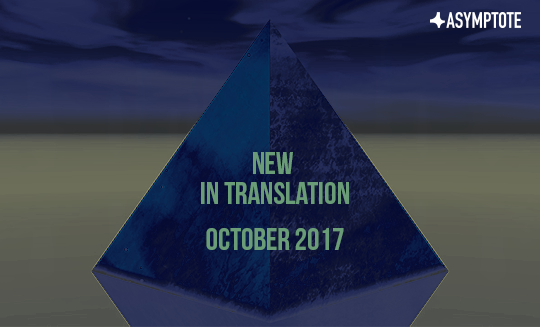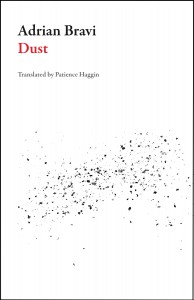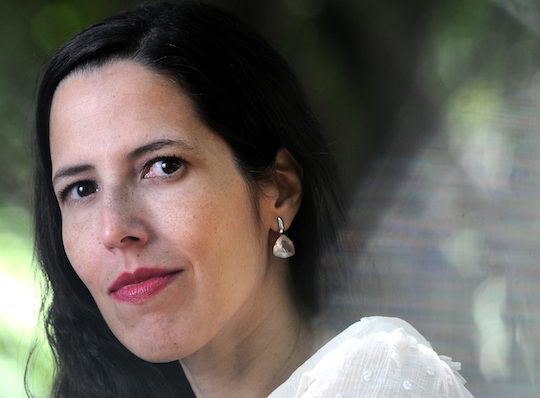Place: Brazil
Asymptote Podcast: Language, Meet Arto Lindsay

In this episode of the Asymptote Podcast, Editor-at-Large Lara Norgaard speaks with the experimental Brazilian-American musician, Arto Lindsay.
Milton Hatoum’s The Brothers and the Politics of Forgetting
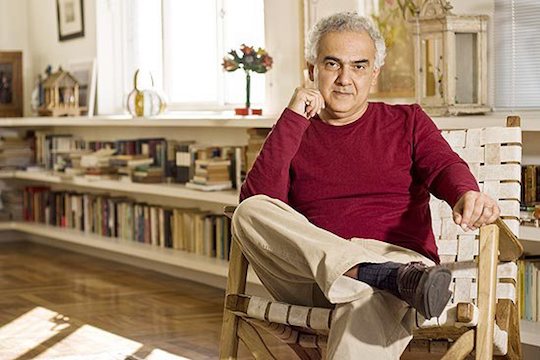
Oppression builds insidiously, explodes in all its terror, and then slips quietly back under the surface.
I stand in my basement facing stacks of cardboard boxes, the remnants of my last cross-country move out to Boulder, CO. If you were to take a cross-section of each box, you would see the sediments of everyday objects: a top layer of clothes; the occasional sweater enveloping a ceramic mug; a layer of miscellaneous household necessities (clothes hangers, desk supplies, etc.); and finally, a thick deposit of books.
At the bottom of one of these boxes I found a thin book, barely visible between the thick spines of a heavily annotated copy of Bolaño’s The Savage Detectives and a fat collection of Pushkin short stories. I pulled out the paperback, which turned out to be a Brazilian novel, The Brothers, written by Milton Hatoum and translated into English by John Gledson. I couldn’t be sure if I had actually read the book before rediscovering it in the crevice of a cardboard box.
I flipped to the copyright information. The original was published in 2000, with the English translation released two years later. Milton Hatoum is a Brazilian author of Lebanese descent, born in 1952 in Manaus, a city in the Amazon. I flipped to the blurb, which promised the story of a Lebanese immigrant family, focusing on the rivalry between two twins, Yaqub and Omar, who live in Manaus in the latter half of the 20th century.
It’s an intriguing premise, one that draws on the age-old trope of brotherly rivalry, harkening back to Cain and Abel, to The Brothers Karamazov, and to Machado de Assis’s Esaú e Jacó. The novel promised to capture the author’s own experience as a man of Middle Eastern descent from a peripheral region of Brazil. I couldn’t remember how it went from my bookshelf to being snugly packed, which made me curious to investigate further. I left my final box unopened, sat down on the pillows and blankets I had piled on the floor, and began reading. The novel opens with an epigraph, a quote from a Carlos Drummond de Andrade poem:
“The house was sold with all its memories
all its furniture all its nightmares
all the sins committed, or just about to be;
the house was sold with the sound of its doors banging
with its windy corridors its view of the world
its imponderables.”
The narrative then begins with Yaqub’s homecoming to Manaus from Lebanon, where he had spent some years of his youth, and the reuniting of the two twins under a single roof. Hatoum unveils ever-mounting tensions amongst members of the family through their domestic alliances and conflicts, and the touching and torrid backstories that define those relationships; rich descriptions of setting provide a fascinating portrait of Manaus, albeit one that is devoid of exoticization; and the complex exploration of character in simple, quotidian situations calls upon the wide-ranging tradition of the family saga in literature.
A quick zip through the literary world with Asymptote! Today we are visiting Iran, Brazil, and South Africa. Literary festivals, new books, and a lot more await you.
Poupeh Missaghi, Editor-at-Large, fills you up on what’s been happening in Iran:
The Persian translation of Oriana Fallaci’s Nothing and Amen finding its way into Iran’s bestsellers list almost fifty years after the first publication of the translation. The book was translated in 1971 by Lili Golestan, translator and prominent Iranian art gallery owner in Tehran, and since then has had more than a dozen editions published. The most recent round of sales is related to Golestan giving a TEDx talk in Tehran a few weeks ago about her life in which she spoke of how that book was the first she ever translated and how its publication and becoming a bestseller has changed her life.
In other exciting news from Iran, the Tehran Book Garden opened its doors to the public recently. Advertised as “the largest bookstore in the world,” the space is more of a cultural complex consisting of cinemas, cultural centers, art galleries, a children’s library, science and game halls, and more. One of the key goals of the complex is to cater to families and provide the youth with a space for literary, cultural, scientific, educational, and entertainment activities. The complex is considered a significant cultural investment for the the Iranian capital of more than twelve million residents and it has since its opening become a popular destination with people of different ages and interests.
Finally, a piece of news related to translation from Iran that is amusing but also quite disturbing. It relates to the simultaneous interpretation into Persian of President Trump’s speech in the recent U.N. General Assembly broadcasted live on Iranian state-run TV (IRIB). The interpreter mistranslated several of his sentences about Iran and during some others he remained silent and completely refrained from translating. When the act was denounced by many, the interpreter published a video (aired by the IRIB news channel and available on @shahrvand_paper’s twitter account) in which he explained that he did not want to voice the antagonistic words of Trump against his country and people. This video started another round of responses. Under the tweeted video, many users reminded him of the ethics of the profession and the role of translators/interpreters, while others used the occasion to discuss the issue of censorship and the problematic performance of IRIB in general.
Translation Tuesday: “Blind Spot” from Brief Cartography for Places of No Interest by Marcílio França Castro
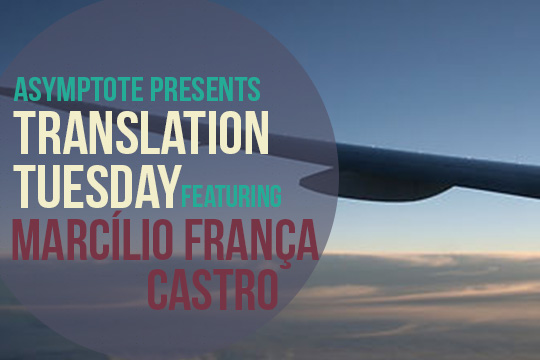
"We banished from cartography all lions, mermaids, pygmies, and dragons. The sterilization of maps only confirms the disdain we have for nature."
When I first met Marcílio França Castro at a coffee shop in Brazil during the winter of 2016, he showed up toting a bag full of presents for me. When he dumped the bag onto the table, out came books, like he was some sort of combination of Jorge Luis Borges and Santa Claus. What most impressed me was his eagerness to promote Brazilian literature in general; several of the books were from his peers and not just ones he had authored. And perhaps Borges is a good comparison for Marcílio; indeed, his writing is in line with the likes of Borges, Calvino, and Cortázar. Yet he does not simply imagine other worlds, he perceives with brilliance unsuspected oddities in places of absolutely no interest. In his short stories, which range from traditional length to flash fiction, and with a prose that is at once economic and yet never lacking in precision, Marcílio França Castro transforms his culture’s most unsuspecting spaces into fantastic reading. The author and I have worked together in producing translations for many of his stories, overcoming differences in idioms, metaphor, sentence structure and other obstacles found in the passage from Portuguese to English. Most importantly, this project kept the translator sane during the subsequent North Dakotan winter of 2017.
—Heath Wing.
The manuals say such devices are made to take anything. Bumps, turbulence, high winds, lightning. Even crashes and hurricanes. It’s said they come out unscathed from the most intemperate of weather. You know the protocols. For every inconvenience there is a plan, an automatic fix. An aircraft like this one, with all its resources, ought to be, according to the manuals, practically uncrashable. That’s why, if it were up to manuals and manufacturers, our role would be merely to maintain course and keep her steady, taking advantage of the dignity of flight and the charm of our profession. And that’s really what we do here, before this gorgeous instrument panel, full of buttons and colorful lights: with the prudence it conveys, we relax and commend our fate and everyone else’s to the invisible wisdom of the display.
Look ahead. The sky’s magnificent, full of stars; someone might say it’s a painting commissioned to decorate the cockpit. A captain, from the moment of departure, always has his beard well-groomed, his uniform impeccable; he pilots the plane with swan-like indifference. That’s how the passengers see you. We fly calmly. The seats are anatomic and dinner well-balanced. An almost anesthetic experience. The Pacific is nothing more than an enormous tapestry of black silk that clips the horizon. We think and act as if the world outside no longer existed, as though the clouds and the ocean below us were but unfailing radar bleeps or a set of geographical coordinates. In truth, as we fly we simply ignore the substance found in Earth’s elements. Try this coffee, it’s wonderful.
Translation Tuesday: “What No Longer Exists” by Krishna Monteiro
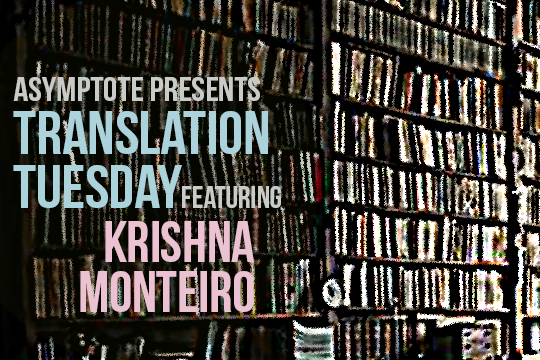
“Where is everyone?” They’re not here, I reply. They no longer exist, I proclaim.
Today’s Translation Tuesday feature is from Brazil. Adam Morris’s skillful translation brings out the haunting quality of the piece, a stunning meditation on life and the afterlife.
“In the desert of Itabira
the shadow of my father
took me by the hand.”
—Carlos Drummond de Andrade
The first time I saw you since you died, you were in the living room, in front of my bookcase. The same immaculate beige overcoat as always, the firm press of your shoes crushing the surface of the carpet. You were reordering my books, removing volumes, violating pages, polluting my silence, my secrets. You were pulling from the shelves authors who had taken shelter there long ago, characters and dreams long since forgotten. Without realizing the distance between the two worlds that separated us, without considering that perhaps the cognac and cigarettes or the nightly fumes in which I indulged might be responsible for your return, I went down the stairs into the living room of the big house on Rua da Várzea where you and I and she (do you remember her?) had lived for so long. I ran down the stairs possessed, threw myself in front of you and addressed you with a courage that had never pulsed in me during the entire time you remained among the living. READ MORE…
Brazilian Academic Raquel Parrine Remembers Antonio Candido, 1918-2017
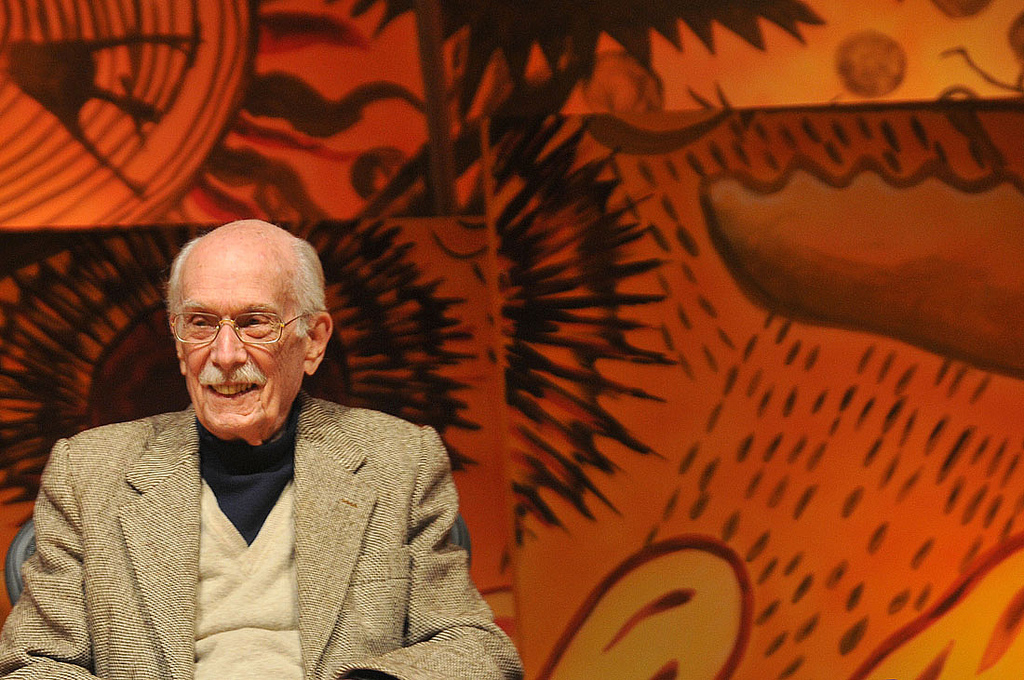
Candido’s death has engendered a crisis of heritage and legacy.
Antonio Candido, born in 1918 in Rio de Janeiro, passed away last week on May 12 in São Paulo. A writer, editor, critic and academic, he remains one of the best known and most influential literary figures in Brazil. Candido joined the Brazilian Socialist Party in the 1940s and was an active member of the resistance under the dictatorship of Getúlio Dornelles Vargas. He reviewed the earliest work of Brazilian greats like João Cabral de Melo Neto and Clarice Lispector and went on to teach for many years at the University of São Paulo. He received the Alfonso Reyes International Prize for lifetime achievement—the first Brazilian to be so recognized—among many other awards and honors. Here, Raquel Parrine writes of his legacy and the empty space that a new generation of political thinkers and writers will need to fill.
It is hard for me to write about Antonio Candido. The more I think about it, the more overwhelmed I feel by the impact he had on literary scholarship in Brazil, and on the country itself. Professor Candido was a moral compass, a political trailblazer, and a dearly beloved human being. It is hard to talk about him without resorting to grandiloquent terms, which would reduce his very significant impact on his familiars and on Brazilian society.
I don’t think there is any doubt that Professor Candido was Brazil’s most important literary critic. He belongs to a generation of sociologists and economists who took it upon themselves to inaugurate a properly Brazilian scholarship, but also, and perhaps more importantly, to own the political discourse about our culture, and our exceptionality.


